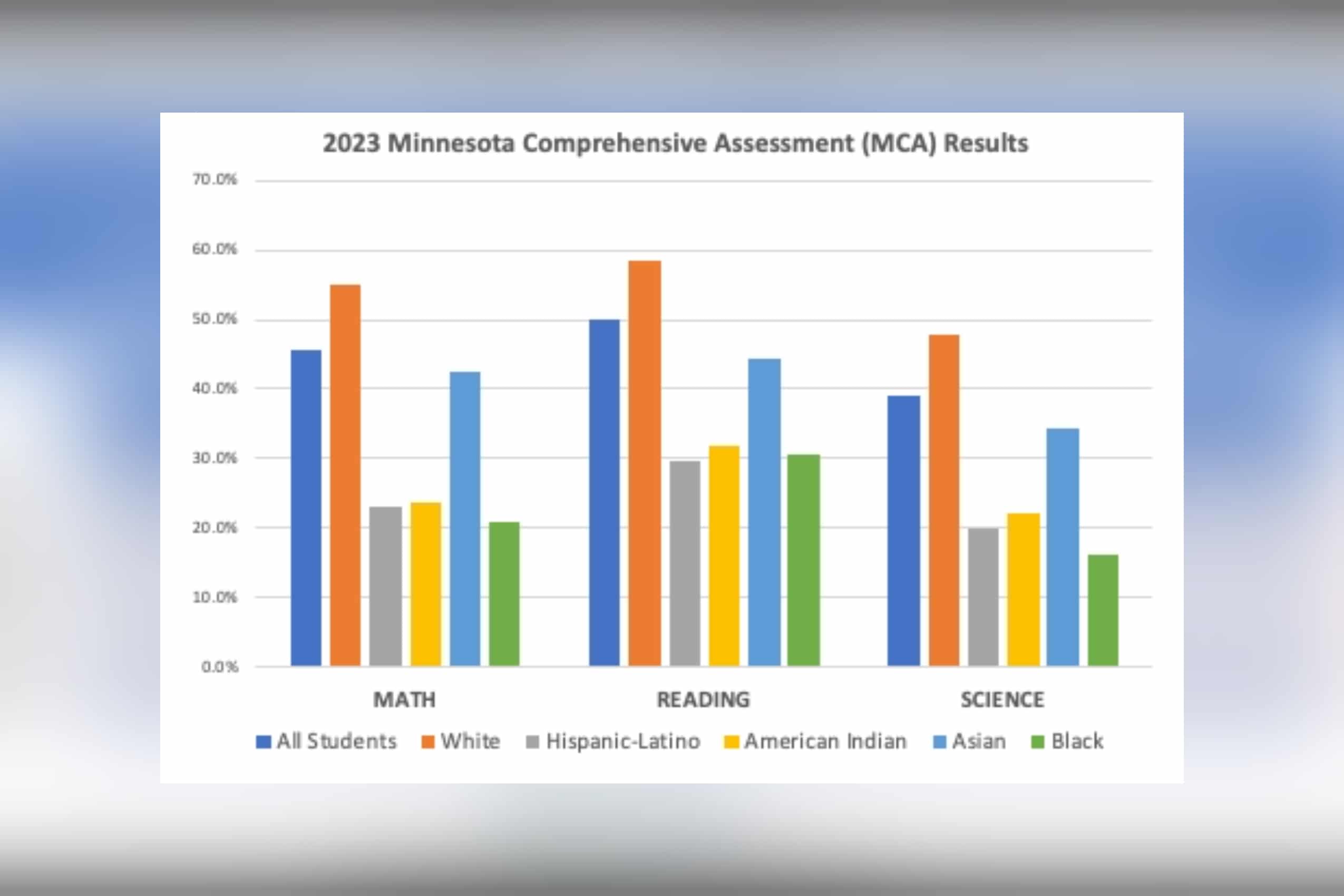
Since the summer of 2022, I have volunteered alongside former state legislator Ken Wolf, R-Burnsville, to conduct research related to public education finance in Minnesota. Wolf was a member of the Minnesota House Education Finance Committee for many years, and for decades regarded as a champion of education funding transparency. Based on our visits to the State Capitol, he still has many friends on both sides of the aisle.
Utilizing financial information sourced through the Minnesota Department of Education (MDE), we successfully debunked the prevailing narrative that funding for Minnesota public schools is inadequate and has not kept pace with inflation. Our work has been reviewed and corroborated by several institutions, including the Minnesota Foundation for Fiscal Excellence and the Association of Metropolitan School Districts. The true measure of school funding is combined revenue as reported by the MDE, which combines state aid and local tax levies. The facts do not lie. Combined revenue for public schools has exceeded inflation for more than two decades, both statewide and at the district level. We understand that cost structures for school districts vary, with nuances and variables related to expenditures. However, the information we compiled is based 100% on factual data available to the public.

As part of our research, we contrasted revenue increases against the two most common forms of standardized testing utilized to measure academic proficiency for K-12 students: the Minnesota Comprehensive Assessment (MCA) and the American College Testing (ACT) scores. The facts we uncovered reveal an inconvenient truth for the MDE and the many school administrators. Education spending ranks as the largest expense of the annual state budget (more than $12 billion in FY 2023), yet academic performance amongst K-12 students is abysmal and in a state of decline. Once touted as one of the best in the nation, the Minnesota public school system is failing. In 2023, more than half of all K-12 students are not performing at grade-level in core education curriculum with only 45.5% of students proficient in math, 49.9% in reading and 39.2% in science.
Hopkins Public Schools: A case study
As families increasingly seek school alternatives, education leaders are quick to deflect the blame, citing Covid-19 school closures as the reason for learning loss, pushing the “underfunded” narrative and amplifying recent criticisms of standardized testing as a measure of student performance. One example of many is Hopkins Public Schools. Once lauded as a model of academic success and a destination for families seeking a quality K-12 education, the Hopkins administration and school board dismisses standardized testing as a measure of student performance, claiming the tests are racist.
“There has been a nationwide divestment in standardized testing, that as people recognize the racist and classist origins of these types of assessment,” said Board Chair Jen Westmoreland who presides over a district where in 2023 only 11% of Hispanic-Latino middle-school and high-school students were proficient in science and a meager 14% of all Black students districtwide were proficient in math, including a stunningly low 3% of fifth-graders. Yet, district leadership is puzzled about why the parents of more than 1,000 students choose to open-enroll in the neighboring Minnetonka School District, which has much better results in standardized testing across all demographics.
Apparently, after decades of unfettered recognition as a barometer of academic proficiency, standardized testing is no longer regarded as an accurate measurement of student achievement by the state’s education elite. Hopkins Superintendent Rhoda Mhiripiri-Reed stated during a learning and achievement update in 2022 that “one single test score does not accurately or completely represent what students know or are able to do.” While there is some truth to the notion that one test score does not represent what a student knows, the preponderance of MCA and ACT data over the past decade points to a concerning decline in academic proficiency among Minnesota students. Now is the time to acknowledge there is a problem requiring a solution. Instead, as standardized test scores deteriorate, Education Minnesota and school boards blame the tests. Then the union uses member dues and tax dollars to demonize parent-backed and academic-focused candidates for school board elections.
Administrators and school board leaders like Mhiripiri-Reed and Westmoreland have yet to provide any evidence to support their claims, instead paying education consultants like Fastbridge to conduct learning assessments so they can inform the public that average district test scores of 37% in math and 39% in reading “meets target.” When confronted by the troubling academic data, they blame learning loss on the pandemic while touting exemplary test scores in “cultural awareness.” District administrators maneuver and pontificate to protect six-figure salaries they collect for presiding over districts derelict in performing the stated mission of public education as stated in Minnesota statute:
“The mission of public education in Minnesota, a system for lifelong learning, is to ensure individual academic achievement, an informed citizenry, and a highly productive work force … The public schools of this state shall serve the needs of the students by cooperating with the students’ parents and legal guardians to develop the students’ intellectual capabilities and lifework skills in a safe and positive environment.”
Public schools fail to achieve their stated mission
By statute, the Department of Education and its member schools are obligated to “prevent the waste or unnecessary spending of public money.” Sadly, wasteful expenditures and declining academic performance appear to be the new normal in public school districts across Minnesota.
In Anoka-Hennepin, the state’s largest school district, board members recently approved a second tranche of $8 million in spending to “close the achievement gap” between minority students and their peers. Prior to the vote, one common-sense school board member pointed out that based on results of the first $8 million spent, the gap was closed by one tenth of one percent (0.001). He then pointed out that at the present rate, it would take 250 years and $2 billion in funding to close the current gap of 25 percent. In yet another school board decision devoid of logic, the school board approved the expenditure by a 5-1 vote and taxpayers from Anoka-Hennepin forked over another $8 million. This level of financial mismanagement is commonplace with public school boards statewide. When businesses operate with the same level of financial mismanagement, they generally file for bankruptcy or face fraud charges.
Certainly school closures impacted learning loss as the drop in MCA test scores demonstrates, but K-12 academic performance was in decline long before the pandemic. In the five years leading up to school closures, statewide math scores fell 10.4% to a grade-level proficiency of 55% in 2019, meaning barely half of all K-12 students in Minnesota were proficient in math before anyone heard of Covid-19. And while the academic proficiency numbers are deeply disturbing and should concern those who want our schools to build a foundation for promising futures for all students, the data is more troubling when test results are calculated by race. As the MDE and district administrators promote and implement diversity-based policies and curriculum, the students they claim to support are suffering in the classroom. In 2023, less than a quarter of Hispanic-Latino, Black, and American Indian students were grade-level proficient in math, achieving well below the already poor statewide average of 45.5%.

At a time when many Minnesota families are struggling to pay their bills, the state legislature continues to rubber stamp massive amounts of spending on what amounts to a defective product, while the tone-deaf Education Minnesota clamors constantly for increases in wages and benefits. Mainstream media sources refuse to adequately and accurately cover public education issues, unless it has something to do with the latest trend in student activism. Lastly, the vast majority of parents and residents are completely detached from school board matters.
This is not a call for activism, but rather a call-to-action for people to consider what they can do to influence positive change. Identifying common-sense school board candidates, following the activities of parent-friendly groups like the Minnesota Parents Alliance, attending the occasional school board meeting, participating in school board elections, and contacting your representatives are all part of the solution. The success of future generations and the livability of our state is at stake and we must rally more individuals to become involved and engaged. We must hold candidates for statewide and local offices accountable for managing the largest budget line-item of the state’s ballooning budget.
The Walz administration regularly virtue signals on social media about providing school meals and making false claims about book bans, but the governor gives zero visibility to the disturbing failure of public schools to achieve their stated mission — to educate children and prepare them to be productive citizens. It is long overdue for Minnesotans to demand action from St. Paul and from their elected school boards.
In 2024 and beyond, education must be elevated to become one of the top issues for state and local elections, for it impacts the daily lives of Minnesota residents more than what currently dominates the news cycle. Our schools are producing the next generation of doctors, lawyers, electricians, chemists, accountants, teachers, community leaders and more. A healthy K-12 education system is vital to maintaining a healthy, vibrant society. The time is now for people in our state to make themselves more aware of what is transpiring in local school districts and to encourage friends and neighbors to participate in school board elections.
Bob Fallen is the Founder of Local Elections Matter, an organization with a mission to inform citizens about local School Board governance processes and to motivate greater public engagement and amplification of matters that impact school districts. Local Elections Matter can be found on X: LEM_Minnesota and on Facebook.
Bob Fallen
Bob Fallen is the Founder of Local Elections Matter, an organization with a mission to inform citizens about local School Board governance processes and to motivate greater public engagement and amplification of matters that impact school districts. Local Elections Matter can be found on X: LEM_Minnesota and on Facebook.









